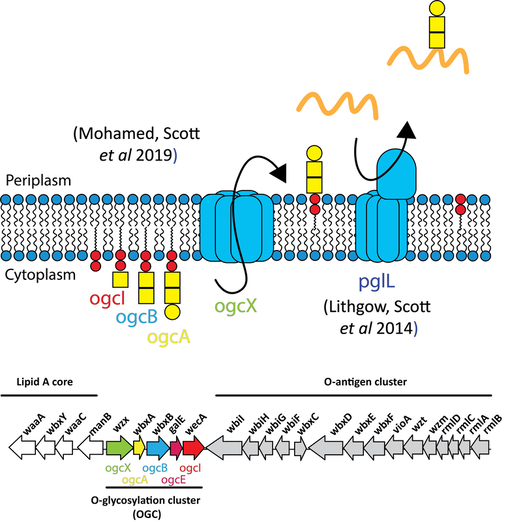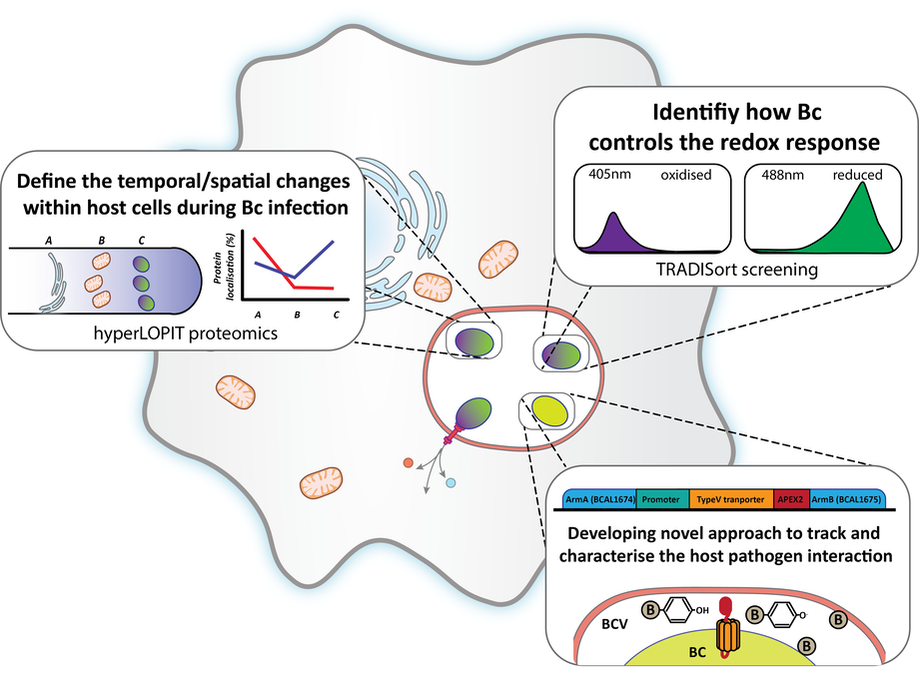Although the Scott lab works on a number of projects and organisms our key research focuses are around understand glycosylation within the bacterial species such as the Burkholderia genus. Burkholderia species cause a number of diseases in human and this is especially true for species like Burkholderia pseudomallei which leads to numerous deaths in Australia each year.
Role of O-linked Glycosylation systems across bacterial species
|
Protein glycosylation, the chemical addition of sugars to proteins, is an important but poorly understood aspect of bacterial physiology. Within the Burkholderia genus, we have discovered a highly conserved O-linked glycosylation system. The conservation of this system across pathogenic and non-pathogenic species suggests that glycosylation plays a far more fundamental role in the physiology of species such as Bukholderia, Neisseria and Acinetobacter than previously thought. The goal of these projects are to understand the role, diversity and machinery responsible for glycosylation in bacterial species. By studying glycosylation within species such as Burkholderia and Acinetobacter we aim to gain a fundamental understanding of this biological processes and how it contributes to bacterial survival. The long-term goal of this project is to learn how we can target protein glycosylation to generate new antimicrobial agents, and how we can exploit bacterial glycosylation systems to generate novel glycoconjugates such as vaccines.
|
Development of novel proteomic tools to explore bacterial pathogenesis
|
Multiple bacterial pathogens escape detection and removal by the host immune system by hiding within cells. Understanding how bacteria create hospitable intracellular environments is critical for developing approaches to help prevent infections in immunocompromised individuals, and advancing new therapies to purge these infections from cells. Within this project, we aim to explore new state of the art approaches to track and quantify proteomic changes at the intracellular host pathogen interface. Utilising recent innovations in protein labelling, redox probes and mass spectrometry, both the host and bacterial factors which contribute to intracellular replication will be identified. By applying these tools, we will gain valuable insight into how bacteria such as Burkholderia cenocepacia (a serious opportunistic infection of CF suffers) survives within human macrophages leading to a deeper understanding of the molecular bacterial pathogenesis.
|
Potential students (local and international) are encouraged to contact Dr Scott to discuss research projects.
In addition to these project the Scott lab works with a number of groups both locally and internationally to use mass spectrometry to answer questions including
- Mario Feldman (Washington University in St. Louis); Acinetobacter pathogenesis, Glycobiology and vaccine development
- Miguel Valvano (Queens University in Belfast); Burkholderia glycosylation
- Elizabeth Hartland (Hudson institute in Melbourne); EPEC effector mechanism and the characterisation of effector mediated PTM targets
- Hayley Newton (Monash in Melbourne); Proteomic analysis of bacterial infections
- Justin Boddey (WEHI in Melbourne); Role of glycosylation in Malaria pathogenesis
- Ethan Goddard Borger (WEHI in Melbourne); Role of glycosylation in the Apicomplexa, Sulfoquinovose catabolism, C-glycosylation
- Mitali Sarkar-Tyson (University of Western Australia in Perth); Burkholderia pseudomallei proteomics



